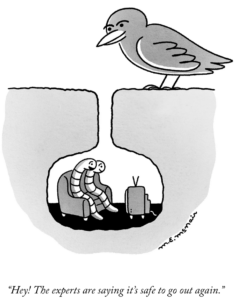Quote of the Day
The seeds of things
Are necessary to support our lives.
By the same token, it is obvious
That all around us noxious particles
Are flying, motes of sickness and of death.
- Lucretius (50 BCE) — in Rolfe Humphries’s translation.
Who wants to be a Lert?
From the New Yorker
Solitude
Nice essay by the poet Donald Hall from a 2016 issue of the New Yorker.
At eighty-seven, I am solitary. I live by myself on one floor of the 1803 farmhouse where my family has lived since the Civil War. After my grandfather died, my grandmother Kate lived here alone. Her three daughters visited her. In 1975, Kate died at ninety-seven, and I took over. Forty-odd years later, I spend my days alone in one of two chairs. From an overstuffed blue chair in my living room I look out the window at the unpainted old barn, golden and empty of its cows and of Riley the horse. I look at a tulip; I look at snow. In the parlor’s mechanical chair, I write these paragraphs and dictate letters. I also watch television news, often without listening, and lie back in the enormous comfort of solitude. People want to come visit, but mostly I refuse them, preserving my continuous silence. Linda comes two nights a week. My two best male friends from New Hampshire, who live in Maine and Manhattan, seldom drop by. A few hours a week, Carole does my laundry and counts my pills and picks up after me. I look forward to her presence and feel relief when she leaves. Now and then, especially at night, solitude loses its soft power and loneliness takes over. I am grateful when solitude returns…
I’m currently reading A History of Solitude by my friend and former colleague David Vincent. It’s beautifully written, thoughtful and thought-provoking. But I’ve been struggling to find a way to give it the attention it deserves in the midst of the torrent of emails, Zoom conferences and other paraphernalia of the lockdown life. But I’ve now found a solution. A book on solitude needs solitude, so I’m setting aside some time each day, to sit with the book in the garden or somewhere in the house, and without any electronic device within reaching distance.
btw some of the stuff Donald Hall has written for the New Yorker over the years is wonderful. For example, this essay on the poetry of death. And, like me, he loves Peter Porter’s great poem, An Exequy, written after his wife’s death, which was the only poem that consoled me when my beloved Sue died in 2002. Just listen to Ian McEwan reading it at the National Theatre and perhaps you can see why.
Contact-tracing and the NHSx app
Here’s a neat way of conveying a complex idea.
Designing a social-distancing picnic-basket for life after lockdown
Robert Caro writes, and waits, during the Covid-19 outbreak
Lovely AP story about the great biographer of Lyndon Johnson, now 84 and hard at work on the fifth and final volume of the five-volume biography.
When asked, inevitably, how soon he will be done with Vol. 5, Caro declines to say directly and give what he calls his standard answer: “It doesn’t matter how long a book takes, what matters is how long a book lasts.” He has received virtually every literary prize, but he savors more private and unexpected tributes, like seeing a young person carrying a copy of one of his books. He then speaks of a recent letter, sent to his literary agent by the fiancee of a judge dying of cancer, that compelled him to respond.
“The fiancee wrote this beautiful letter, saying that my books meant a great deal to him, and that a letter would mean a lot to him,” Caro says. “So I spent a couple of hours composing a letter. I try to answer handwritten letters and I’ve been getting more of them since the pandemic. I used to get mostly emails. Handwritten letters had almost stopped.”
Quarantine diary — Day 51
This blog is also available as a once-a-day email. If you think this might suit you better, why not subscribe? One email a day, delivered to your inbox at 7am UK time. It’s free — and there’s a one-click unsubscribe link if you decide that your inbox is already full enough!


